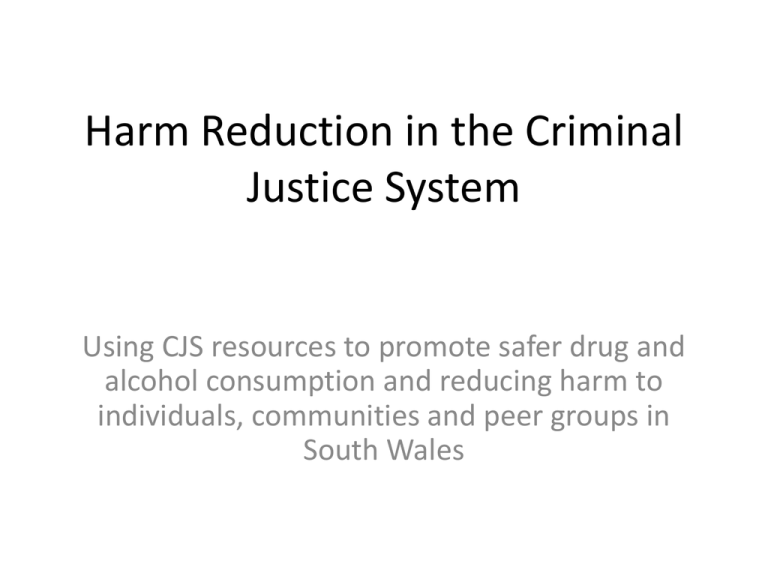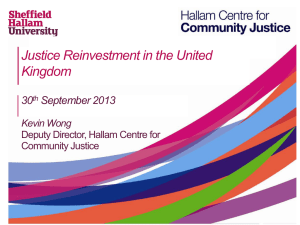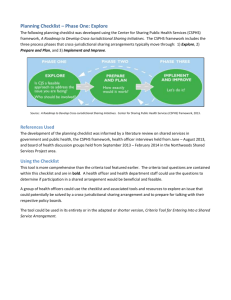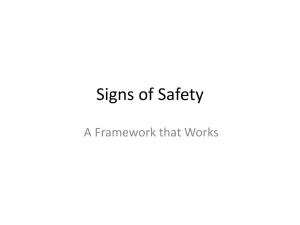
Harm Reduction in the Criminal
Justice System
Using CJS resources to promote safer drug and
alcohol consumption and reducing harm to
individuals, communities and peer groups in
South Wales
Pathways into the Criminal Justice System
in South Wales for adults {18+}
• What do we understand as involvement with
the criminal justice system for substance
dependant individuals ? There are some
obvious examples :
- Police custody on arrest
- Prison and YOI{age 18-22} on sentence
- Community penalties/Probation
Pathways into the ‘Criminal Justice System’
in South Wales for ‘adults’ {18+}
• There are some less well known pathways :
- Testing on arrest for ‘class A’ drugs
- Drug and alcohol arrest referral in custody
- Mental Health Act
- Drug Interventions Programme / IOIs
- Detained Foreign Nationals
- Sex workers { section 17}
A Changing Landscape
• Traditionally the CJS has been about punishment and
restriction of an individuals freedom to reduce harms
associated with that individuals offending behaviour.
• The role of drug and or alcohol use was
acknowledged as a driver for offending behaviour
but it was not until the development of Drug Testing
and Treatment Orders {DTTOs} ,arrest referral
schemes and the Drug Interventions Programme {
DIP} that the CJS started to structurally address the
need to engage people in treatment.
A Changed Landscape
It is now accepted that ‘offenders’ with drug and/or
alcohol problems will continue to offend unless they
can access treatment and support quickly. This is a
major change in strategic and operational thinking in a
relatively short space of time.
In South Wales this has led to the commissioning of an
Integrated Offender Interventions Service from
1/4/2012.
Integrated Offender Interventions
South Wales – What is it?
Statutory CJS Treatment
Voluntary CJS Treatment
DRR/AAR/ATR
Drug Interventions Programme
Integrated Offender Interventions
Service - South Wales
Integrated CJS Interventions – A Key
Milestone
An Integrated approach for all CJS treatment
interventions for adults { 18+} will allow
partners to widen their scope : the reduction
of harm to self, communities and peers is no
longer incompatible with the reduction in
offending behaviour.
How Could CJS agencies need to work to
promote harm reduction in CJS settings?
Provision of harm reduction in CJS settings?
Individuals become embroiled with the CJS in
many ways – the vast majority of them will at
some point find themselves in a police
custody suite.
This commonality of situation gives an ideal
opportunity to potentially provide practical
harm reduction interventions on a voluntary
basis.
‘Needle Exchange’ in Police Custody
Many drug using individuals will try to discard evidence of
drug use, including injecting equipment, pipes, foil etc, as
well as the drugs.
Custody staff will remove works that have not been
discarded
The majority will be released without charge or bailed.
Currently arrest referral workers will offer brief
interventions and they may well be drug tested if arrested
and assessed for referral into treatment with DIP/IOIs.
However, once released, these individuals may well want to
‘score’ and may well not have access to clean, safe methods
of ingestion.
‘Needle Exchange’ in Police Custody
How can we ensure individuals leaving police custody
have access to clean works and reduce harms to
individuals?
Many traditional NX sites in pharmacies or drug
services are open for limited hours – many individuals
are released outside of these hours with no access to
clean equipment.
How do we facilitate these individuals in a manner that
complements existing NX provisions but does not
criminalise or compromise them?
The answer may well be to ensure NX vending
machines are available in custody suites?
NX vending machines are available in
South Wales custody suites
Josie Smith { Public Health Wales} and Gareth Hopkins {
DIP/IOIs Regional Manager South Wales} are working
with South Wales Police to explore the possible provision
of NX vending machines in custody suites.
Individuals who ask for access to NX packs post release
would be given a token and access to a wall mounted
vending machine in the custody suite. The packs would
include information of nearby NX services, drug services
and harm reduction / safe use advice. The individual drug
user will be in control of the process.
NX in Custody – a contradiction?
A social justice response,
rather than a criminal
“justice” response, to drug
use from within the
core of the CJS?
Reality – ‘Harm Reduction’ already
functions in custody suites
• Brief interventions for drug and alcohol by
DIP/IOIs drug and alcohol arrest referral
workers
• Provision of Mental Health support { EG :
GOFAL}
• Drug Testing on Arrest for ‘Class A’ drugs and a
required assessment for treatment suitability
in the community.
Strange Bedfellows? Harm Reduction and the CJS.
Harm Reduction is a continuum, all the way from
chaotic use to abstinence. It recognizes that abstinence
may not be achievable by everyone.
Understands that using/not using cycle is “normal”
Meets people “where they’re at” by:
• Encouraging safer use
• Offering alternatives
A harm reduction approach provides for
people’s needs regardless of use and is
compatible with a duty of care within the
wider Criminal Justice System.
A future CJS mindset ?
• An understanding that drug use is widespread and complex
• A recognition that some people use drugs – usually for a
reason
• An acceptance that some people will always use drugs
• The aspiration that no one should be denied service or
access to service merely because they are using a drug, licit
or illicit, or conversely, because they are in a criminal justice
setting and not a ‘traditional’ health setting.
• Seeks practical ways to reduce harm without necessarily
eliminating use.
• An acknowledgement of ‘offenders’ as people deserving of
dignity and respect
Finally – some sobering statistics
In Cardiff and Swansea police custody suites April-March
2011/12 c.6,500 individuals were drug tested on arrest and
c.35%/2,275 returned a positive test for opiates, cocaine or
both.
More than 50% of these individuals were not in contact with
or receiving any form of treatment or advice through local
agencies on safer injecting or snorting/smoking/ingesting
It would seem sensible these individuals, and thousands like
them across the whole of Wales, have access to basic NX
services and harm reduction advice at point of crisis? And, it is
an aspiration of the wider CJS community and partnerships to
explore how we can get the right interventions to the right
people at the appropriate time to reduce harm and facilitate
recovery, from within the wider Criminal Justice System.
Diolch Yn Fawr
Thank You












